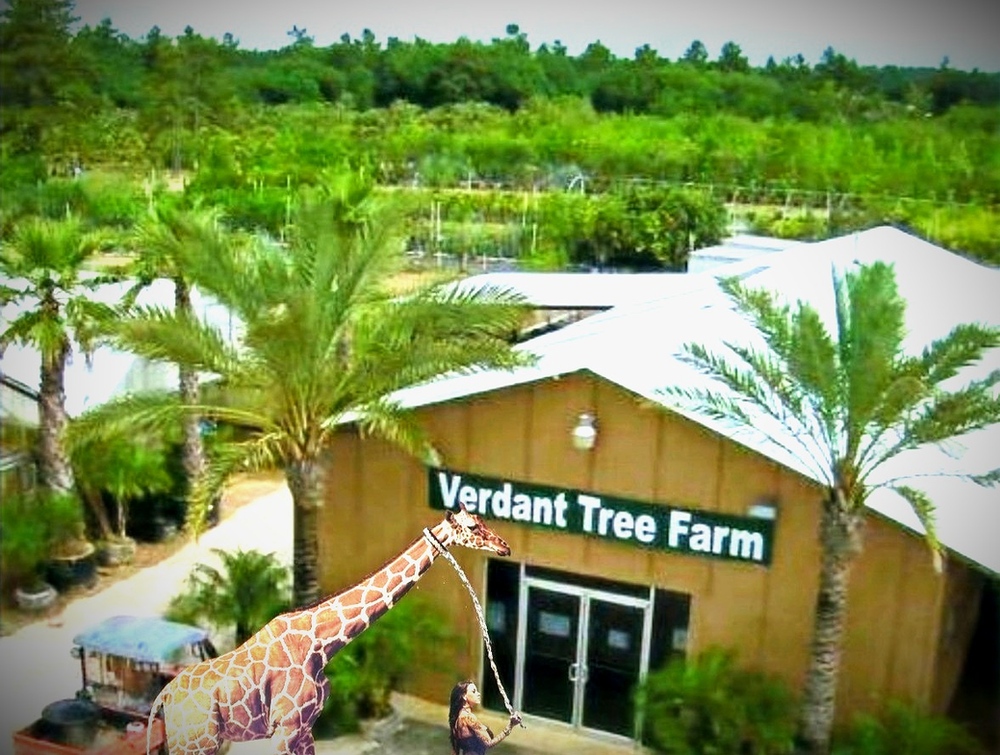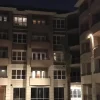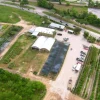
At Verdant, we are very fortunate to get to meet lots of people every day at the farm. As both a retail and wholesale nursery, our clients run the gamut from homeowners and neighbors to builders, landscape architects and landscapers and, regardless of their landscape education, experience or knowledge, each individual will tend towards their own personal and/or professional preferences in both material choices ( i.e., trees and plants, etc.) and design styles.
This is part of the fun of being at the farm and we love that everyone has their own unique vision of a ‘perfect landscape’ and their own heartthrob plants and trees and, by no means, do we expect everyone to want the same exact tree or would we expect everyone to love palms trees. We do expect, however, for our dear palms to get a fair shake. After all, although we do grow and/or sell almost every tree you could imagine, we admittedly have our own bias towards the majestic palm tree – and especially, of course, our famous Medjool and other fabulous date palms.
However, after hearing more than just a few comments that went beyond a mere ‘eh…not my thing’ or even the naïve stereotype of ‘I don’t want a palm tree – I don’t want a tropical landscape’ into statements generally beginning with something like ‘I only want native plants and trees – palms have no business in this part of the world’ and then moving steadily towards more adamantly stated negative “facts” about palms that we finally felt truly compelled to defend our little (giant) darlings.
With such vehement, opinionated and, sadly, misinformed prejudices, we thought we should address and, flat-out, rebut these unfounded, but clearly prevalent opinions about our beloved palm trees.
To begin, let’s discuss one of the most common myths or misnomers about Palms and
address this very common design misconception:
“Palms are only for tropical landscapes”
Not true.
Palms are utilized in and highlight many types of diverse landscape designs throughout Texas and include a vast array of design styles including, but not limited to, Modern/Architectural, Minimalist, Native, Perennial, Classical, Evergreen and Mediterranean designs.

And to speak against some very misinformed nay-sayers, Palms also fit very well, both functionally and aesthetically, into the top current landscape architecture and design trends that focus largely on the following:
· ‘Responsible’ permeable landscape designs that either primarily or solely employ non-invasive, Eco-friendly and native plant material
o Most ‘non-native’ palm species planted throughout Texas “act” very much like native trees and are not only able to merely ‘survive’ within a wide range of climates, conditions and soil-types but have proven to thrive, survive floods, freezes and hurricanes, have long life spans – up to 100+ years, have not shown a threat to either native plants or wildlife and, to the contrary, have proven to be an excellent source of food for many native birds and wildlife.
· ‘Xeriscaping’– selecting plants that require lower than average water requirements
o Palms, especially the Date Palms, Mediterranean fans, Texas and Florida Sabals as well as the non-native large fan species, to name just a few, require very little water in comparison to other ‘natives’ and once the 3-6 month root-acclimation period is over, they can generally survive solely on rainfall (central and southwest Texas regions).
· ‘Wildlife Conservation’ – Incorporating plants and trees that attract butterflies and bees in order to facilitate pollination and to help rebuild a frightening shortage of bees and other pollinators, plant material that attracts beneficial insects and plant and tree species that provide sustenance and/or shelter to a variety of native birds and additional wildlife.
o Most palms produce fruits and while our climate may not be ideal to grow or harvest such delicacies like the Medjool date, the fruit and seeds produced by many palms have become an invaluable food source to our native wildlife.
o The palm flowers have proven beneficial in aiding in cross-pollination and the large, open blooms of many attract a variety of crucial pollinating and honey-producing bees.
o In many areas of Texas and especially down south in the valley, palms provide a critical shelter for the migrating bats that, throughout the summer months, eliminate a significant amount of mosquitoes and other harmful insects.
· ‘Native’ Gardening/Landscaping – A strong focus has been placed on ‘reducing the footprint’ of nutrient-leaching trees or plants as well as any that threaten the health, life or propagation of native. Developers, Builders Landscape Architects and industry as a whole, whether planning for the crowded inner-city and metropolitan areas or for the ever-growing, sprawling suburban developments – are all being driven, not only by governmental or municipal mandates, laws or regulations but also by their very eco-educated, key consumer’s ‘buying power’, to focus on not only replenishing and/or maintaining critical trees and vegetation but also to exhibit clear ‘mindfulness’ and accountability for not only creating a beautiful design but for creating a long-term, sustainable landscape.
· “Vertical” landscaping, or the movement towards not only maximizing growing space in confined land areas but also on improving the air, providing additional human and wildlife sources and also engaging the Architectural and development industry to design buildings that not only employ creative spaces for its occupants to create gardens and plant vegetation, incorporate living plant material for aesthetic and ‘green’ design value as well as create buildings that reduce energy consumption by naturally limiting the costs of cooling, heating and insulation efficiency.

“Palms are NOT a native plant species and have no business in a Texas Landscape!”
Somewhat True. Somewhat False.
Well, FIRST OF ALL, there are a actually a few varieties of palms that actually ARE native Texas species – a couple of examples are the Texas Sabal (Sabal Mexicana/Sabal Texicana) (as the name obviously implies) and, surprising to many – the Pindo (Butia Capitata), also known as “Jelly Palm” (so called for the fruit that is commonly made into jellies). And because of the importance of the Texas Sabal’s role in providing sustenance and shelter to native wildlife, conservation efforts are being made to protect and find new ways to re-propagate them.
And while many of the widely used and highly coveted palms we see throughout Texas ARE, technically, “non-native” (the official US Department of Agriculture’s term for a plant species that was introduced to a region or the US), in general, they are not classified as “invasive” species, nor do they fit in any classification the US gives to plant species that either disrupt or divert, prevent or overtake the viability or growth of native species or cause harm to our ecological system.
In fact, both native palms (such as the Texas Sabal and Pindo) as well as non-natives like our Medjools (Phoenix Dactylifera) and Sylvesters (Phoenix Sylvestris – also referred to as “Indian” , “Silver” or “Wild Date” Palms) produce fruit that, although not easily produced in our region for human consumption, is eaten by many native birds and other wildlife.

Palms are one of the oldest trees in existence. Some say the “tree of life” referenced in the bible was, in fact, the Medjool – a tree in which every single inch of it provided for human sustenance – from the glorious, nutrient-rich Medjool date fruit it produces, to the fronds that provided shelter when dried and made into roofs, to the trunk that was also used to create structures and barriers and even weapons.
There are many palms, including the Medjool and other date palms that have an expected lifespan of 100 years + and there are many in existence today that are hundreds of years old.
The slow growing palm with it’s fine-root system makes it much more amenable than any other large tree to both transplantation as well as to living a long, healthy life in containers/pots, such as exhibited for 100’s of years on the romantic streets of Rome and now, recently, showing up as a striking new trend in Texas, not only in our urban and city streets but also in the skyline of our own modern landscape architecture, as seen in rooftop terraces and upper level pool and park landscapes in a growing number of condominium and High-rise buildings throughout Houston and other metropolitan Texas cities.

“They are not cold hardy and I’m sick of losing palms after our more frequent freezes.”
Somewhat true. Somewhat False.
Not all palms are cold-hardy and knowing which ones are appropriate for your zone is critical – just as it is with any tree, shrub or plant material you choose for your landscape. Just as we can not successfully plant or grow the lovely Norway Spruce or other Northern Conifers sold each year as Christmas trees, for example, because our brutal summer heat and lack of low winter temperatures creates an inhospitable environment, we also ‘should not’ plant truly “tropical’ palms and plants that have also failed to thrive or survive due to being transplanted in a non-native environment in which it has not successfully acclimated to the non-native low or high temperatures.
One Palm, for example, that had successfully thrived and was historically heavily planted in Houston and surrounding gulf coast areas for many years and that suddenly faced a huge decline after significant losses due to almost back to back years that of record-breaking and prolonged freezes, is the Queen Palm – a palm that we, at Verdant, are still busily replacing, mostly with alternate, cold-hardy palms including the Medjool, Sylvester and Pindo palms, several Sabal and Fan varieties as well as with Chinese, Livistona and Windmill Palms.
But just as I mentioned earlier, everyone has their favorite trees and plants and in the Palm world and for those who appreciate or at least take a moment of observance, see that each palm, although fit into several tidy categories such as Fan and Feather especially the Mule Palm, a newly developed palm mutation or cultivar, rather, that combines both the cold-hardiness (to 15 degrees F) of the Pindo Palm with the unique attributes of the Queen palm – the only feather-shaped palm proven to effectively mimmick the graceful movements and seductive sounds that were previously only seen in the lovely Queen, Pygmy and other true tropical and non-cold-hardy palms.
Although we do still carry the Queen Palm as well as the ever beloved Pygmy that have become staples in the tropical landscape in and around Houston, especially, for those who just can’t live without them and are willing to risk the possibility of loss due to freeze, the rest of the palms, such as the Medjool, Sylvester, Canary, Sylvesters we carry and/or grow are cold hard to at least 20 degrees and many with much lower freeze tolerance, such as the Mediterranean, European, Livistona and Windmill – many of these varieties are hardy enough to grace the landscapes of Dallas and other Northern Texas cities.

The Houston landscape exhibits a wide array of all these species and showcases some of the most beautiful, dynamic and stunning commercial and residential landscapes featuring our towering, majestic Medjool Date Palms (Phoenix Dactifylera).
Breathtaking views of some of our palms can be seen while driving past Memorial City Mall where the cloud seeking heads of the Medjools create an architectural masterpiece of green as you drive, high above ground level with an unusual opportunity to truly grasp the unbelievable size and magnificence of these unearthly blooms. To appreciate some of our many other Medjool installs, check out Toyota Center, Kemah Boardwalk, Aquarium downtown, the newly renovated Houston Yacht club or enjoy the rows lining the Galveston causeway on your way to the beach.
In addition to installations throughout Texas and the Gulf Coast, we also have impressive installations in Nevada, California, Florida, Arizona and even many in New Orleans that survived Katrina and are still thriving.
On that note- our Medjools are still standing strong after Harvey as well!

“I’ve never had luck with Palm trees! They died shortly after they were installed and we lost a lot of time and money. I’m staying away from them!”
Sadly, true – IF not selected and planted CORRECTLY….
One of our favorite quotes at Verdant:
“If you think it’s expensive to hire a Professional, just wait until you hire an Amateur’.
Just as with any other investment, it is important to select your palms carefully, deal with a reputable and knowledgeable grower, nursery and installer. There is some validity in recognizing that some Palms did not originate here and many come from a very different climate and environment, especially in areas like Houston and the Gulf Coast, where there is high humidity and clay soils. Also, it is critical to buy palms from someone who KNOWS PALMS.
They are a ‘different animal’, so to speak, and the average homeowner and sometimes even landscaper may not necessarily know how to identify whether a palm is healthy or not and may also very well not understand that planting/installing a palm tree is vastly different than planting almost any other tree.
An additional benefit of most palms is that they are generally very disease and pest resistant. Recently there has been a potentially devastating health threat to several types of date palms known as ‘Lethal Yellowing‘ and, as with many other fears, a little information can be a dangerous thing and there are landscapers that have literally said they will, under no circumstances, EVER plant a date palm again. And not to diminish the serious and potentially lethal effects of this scourge, we are very happy knowing that the palms we grow and sell and are disease free and completely free from this threat. Our palms are grown in Arizona, in their perfect climate and soil and are never transported until their immune system is fully developed and so our date palms are NOT at risk for Lethal Yellowing, unlike palms grown in South Texas and the Valley or Florida, giving yet another reason to trust the Palms and the Professionals at Verdant.

At Verdant, we KNOW palms because we GROW palms and we also have a highly experienced crew, a lot of sophisticated equipment, years of experience in Palm health, selection, spading, transporting, caring for, planting and instructing the new owners or caretakers how to follow the very simple, but very critical instructions in order to insure the health and longevity of this living monument. And because we are so confident in our ability to guarantee our palms when we have installed them ourselves, we offer at no cost, the industry’s best and longest warranty, guaranteeing replacement for an entire year.
We would love to hear feedback from this blog and welcome EVERYONE’s thoughts and feedback! And, better yet, we would love to see some new faces and have a debate in person or hopefully show you why you really did love palm trees after all and either way, just make a new friend.
We are open 7 days a week and always available after hours by appointment. Come by and see our 20 acres of trees and palms, conveniently located at 4300 Barker Cypress, Houston, 77084. Give us a call anytime as well – main # 281-345-6789.

We would love to hear feedback from this blog and welcome EVERYONE’s thoughts and feedback! And, better yet, we would love to see some new faces and have a debate in person or hopefully show you why you really did love palm trees after all and either way, just make a new friend.
We are open 7 days a week starting in March and until then are open Monday- Saturday and always by appointment. Come by and see our 20 acres of trees and palms, conveniently located at
4300 Barker Cypress, Houston, 77084
Give us a call anytime as well – main # 281-345-6789
Here is a list of Just a few of our trees we carry: Medjools, Phoenix Dactylifera, California fan palm, Pindo, Sylvester, Mediterranean fan, Pygmy, Queen, Live oak, Red Oak, Bald Cypress, Green Ash, Mexican Sycamore, Bottlebrush, Cedar Elm, Magnolia, Mule Palms, Texas Sabal, Windmill Palm, ect.
#landscape #Medjool #install #poolscape #Nursery #pool #HTX #houstonpools #hgtv #Houzz #custompools #luxurypools #customhomes #gardendesign #landscapedesign #outdoorliving #outdoorspaces #garden #outdoordesign #katylandscape #sugarlandlandscape #tomballlandscape #TheWoodlandsLandscape #SpringLandscape #PearlandLandscape
Thanks
Patrick Amery
Serving Houston, tx Katy, tx Texas city, tx Galveston, tx and all surrounding areas



